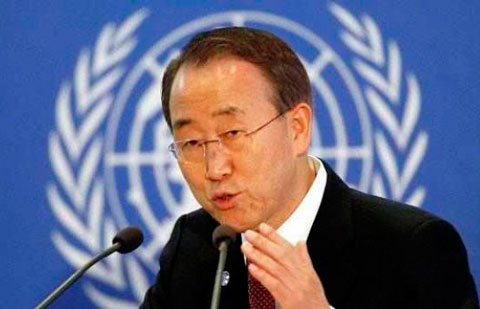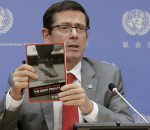UN Secretary-General: "I Will Never Stop Calling for an End to the Death Penalty"
Calling the punishment "simply wrong," United Nations Secretary-General Ban Ki-Moon has vowed to "never stop calling for an end to the death penalty." Speaking at the launch of a new book by the Office of the UN High Commissioner for Human Rights, "Moving Away from the Death Penalty: Arguments, Trends and Perspectives," the Secretary-General highlighted the worldwide decline of capital punishment, noting that "more and more countries and States are abolishing the death penalty."
Assistant Secretary-General for Human Rights Ivan Šimonović added that the purpose of the book is to “contribute to such a trend,” but warned that even though there is a drop in the number of documented executions, there is a possibility of several executions being conducted which are not registered or reported accurately.
Data from the book confirms these trends: in 1975, about 97% of countries were carrying out executions, as compared to only 27% today. Ban Ki-Moon appeared alongside Kirk Bloodsworth, the first death-sentenced person in the U.S. to have been exonerated by DNA evidence. The Secretary-General said of Bloodsworth, "[Mr. Bloodsworth] represents the reason we are here today. He is totally innocent of any crime. But like too many other people, he suffered the unforgiveable injustice of a death sentence… I am conscious that he says he was not exonerated because the system worked but because of a series of miracles." Bloodsworth explained his reasons for supporting abolition by saying, "It’s very simple: if it can happen to me it can happen to anyone; in America or anywhere. What I’m saying is that an innocent person can be executed and that should never happen. If it can happen to me it can happen to anybody anywhere in the world."
Ban Ki-Moon also emphasized the “harsh reality” that the death penalty discriminates. "Study after study proves that if you are poor, minority or mentally disabled, you are at higher risk regardless of guilt or innocence,” he said. “When we safeguard the human rights of the most vulnerable, we promote more peaceful, just and stable conditions for all.”
About 160 countries have already abolished the death penalty or introduced a moratorium on its use. In 1948, there were only 14 such countries. Even though in 2015 no state imposed a ban on the death penalty, there has been a 22 percent reduction in the number of executions.
International law allows the death penalty only in exceptional cases and only for the most serious crimes. However, the Second Optional Protocol to the International Covenant on Civil and Political Rights encourages all states to introduce a ban on this type of criminal punishment.
Despite many years of criticism from human rights activists, Belarus has not signed the Second Optional Protocol and continues to use the death penalty.



















